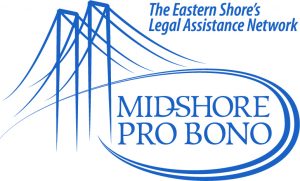
Imagine the threat of eviction from your home with a young child and a baby on the way. That’s what one Caroline County woman faced after her income was significantly impacted by the COVID pandemic.
“I am a real estate agent and wasn’t showing homes at the time because of COVID. I had my own cleaning business, but nobody wanted me in their home because of the fear of infection. My fiancé got laid off and the only thing I could do to keep my daughter in diapers and food on the table was my part-time payroll job. It wasn’t enough.”
It didn’t take long before text messages started rolling in from her landlord about the rent being due. Where was it? She just didn’t have it.
“I did the math and lost about $30,000 in income this year. I knew I had to do something. I applied for rental assistance but found out I needed a court ordered eviction notice to get help. I looked at relocating to Martin’s House and Barn in Ridgely but was afraid of exposing my children to others in a shelter. I ended up on their waiting list. Then I received a text from my landlord that said, “I’m taking you to court. I have someone who wants to buy the house.”
As quickly as she read the text message, she had a court date scheduled within two weeks and needed an attorney.
“A friend told me about Mid-Shore Pro Bono, so I went online and filled out the intake form. Meredith called me soon after to tell me they could help me. My attorney, Basil Wadkovsky, knew exactly what to do.”
“Our client took the right steps to get the help she needed and saved herself and her family from eviction,” said Meredith Lathbury Girard, Esq., managing attorney, Mid-Shore Pro Bono. “But many people don’t realize they need to take action before it’s too late. As soon as an individual gets a letter from their landlord or the courts – that is when we can assist them. I have been on the phone with clients as the sheriff’s office is physically removing their belongings from their home. Then it’s a dire and desperate situation.”
Fortunately, the outcome for this tenant was positive because her lease did not expire for another few months. For others who are not diligent and do not act promptly, the result could be devastating, like in the case of a tenant who remains in possession of a property after the lease is up. This warrants the landlord to bring Tenant Holding Over action which can ultimately mean an eviction ruling in court.
“The lack of affordable housing problem on the shore has existed for some time,” added Meredith. “COVID cracked it wide open. We believe it is our responsibility to educate the community about their rights and assist them in protecting those rights.”
Mid-Shore Pro Bono (MSPB) is taking action to help tenants who are being evicted even after Governor Hogan’s executive order was issued to halt certain evictions during the COVID pandemic. And while Maryland courts have also issued their own halt for failure to pay rent cases through the end of the year – people in our own community are still being evicted from their homes.
What people need to know!
While currently there are limited protections available for tenants, these protections do not automatically prevent eviction. These protections may delay an eventual eviction, but they do not mean that tenants do not have to pay their rent. Rent will eventually have to be paid.
Tenants will still need to take the following actions to safeguard themselves and their families:
· Signing a statement about the impact COVID-19 has had on their ability to pay rent
· Providing proof that their income was impacted by the pandemic which may include loss of job, loss of wages, closure of the place of work, or the need to miss work to take care of school age children.
· If a tenant receives an eviction notice or is served a summons to appear in court for a landlord tenant issue, they must appear in court to protect their rights.
Tenants
MSPB is advising tenants to apply for local emergency assistance and keep records of the programs they apply for and if funding was provided. They need to know that their landlord can still evict them if their lease is ending and the landlord does not agree to renew the lease.
Tenants may have defenses to a failure to pay rent case under the Center for Disease Control Declaration which provides protections for people who have made an effort to get assistance, earned less than $99,000 in 2020, lost income or experienced increased medical expenses due to COVID-19, made best efforts to make partial payments, if evicted, would likely become homeless.
Evictions are still taking place and landlords are obtaining judgements which gives them the ability to collect the rent later.
Landlords
In general, when a tenant fails to pay rent, the landlord can file a complaint with the court to either recover the rent money or repossess (i.e. evict) the tenant. There are usually two steps in the process. The first is a failure to pay rent hearing. If the tenant is unable to come up with the rent money, then the landlord can file for a warrant of restitution, which if successful will result in the tenant being evicted.
Maryland’s courts have gone back to Phase II**, which means that until January 15, 2021, the courts are limiting the types of matters they are hearing, limiting in-person appearances in court, and encouraging use of remote technology. During this time, landlords can file a complaint in District Court, but their matter will not be heard until after January 15, 2021. Failure to pay rent hearings scheduled between November 15, 2020 and January 15, 2021 have been postponed and will be re-scheduled by the court. If you have questions about when your hearing is scheduled, you should call the court.
Resources
If tenants are behind on rent, there are resources available to help:
Caroline County: call 443-988-5009, or apply online: https://www.cdc.gov/coronavirus/2019-ncov/covid-eviction-declaration.html
Dorchester County: Delmarva Community Services: 410-901-2991
Kent County: Maryland Rural Development Corporation 410-482-2585
Queen Anne’s County: Housing Division, 410-778-3977
Somerset County: Somerset County Government, 410-651-1424
Talbot County: Department of Social Services, 410-820-4347, or apply online: https://talbotcovid19.org/
Wicomico County: Habitat for Humanity, call 410-546-1551 or apply online: https://www.wicomicohabitat.org/
City of Salisbury: Neighborhood Housing Services, 410-543-4626
Worcester County: Diakonia, 410-213-0923, https://diakoniaoc.org/
People with lack of access to technology for videoconferencing can get help by working with a local civil legal service provider, such as Mid-Shore Pro Bono, Legal Aid, or the Mid-Shore Council on Family Violence.
Legal Assistance:
Mid-Shore Pro Bono, call 410-690-8128, www.midshoreprobono.org
Legal Aid, Call Easton Office at 410-763-9376 or Salisbury Office at 410-546-5511, https://www.mdlab.org/ Mid-Shore Council on Family Violence, 410-690-3222, https://mscfv.org/



